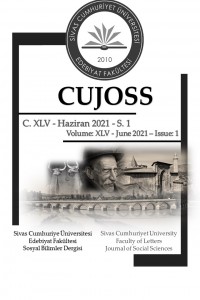Abstract
Caryl Phillips’in sömürgecilik sonrası romanı The Lost Child, tamamı yalnızlık konusuna odaklı çeşitli hikâyeler sunarak yetimliğin ve çocuk ihmalinin psikolojik etkilerini incelemektedir. Özellikle kimlikle ilgili mücadeleler ve ötekilik problemi açısından, bireylerin psikolojik travmalarına neden olan ailesel sıkıntıların sonucunda ortaya çıkan yalnızlığın etkileri postkolonyal bir bakış açısıyla ele alınmaktadır. Phillips’in romanındaki karakterler ya yalnızlığı ya ebeveynsizliği ya da her ikisini birden deneyimlerler. Karakterlerin çocukları veya ebeveynleri ya fiziksel olarak ayrılırlar ya da genellikle önlenemez bir iletişim boşluğu ile birbirlerinden ayrı kalmak durumunda kalırlar.
Çalışmada ebeveynleri Monica ve Julius Wilson’un ilgisizliği arasında kaybolup giden, melez kimlikleri nedeniyle öteki olarak görüldükleri bir toplumda yaşamaya maruz kalan Ben ve Tommy başta olmak üzere imparatorluğun diğer kayıp çocuklarının psikolojik travmaları kimlik sorunsalı bakış açısıyla ele alınacaktır. Sömürgeci zihniyetin yarattığı ekonomik ve psikolojik nedenlerden dolayı yaşanan ötekileştirme, aile içinde çatışmalara, kültürel benlik kaybına yol açarak ikilemli yaşam ve kültür arasında oluşan melez kuşakları ortaya çıkarır. Bu noktada yapıtta sömürgecilik sonrası İngiliz toplumunda ortaya çıkan melezlik, ötekilik deneyimleri ışığında çocukların ve ailelerinin yaşadıkları psikolojik travmalar postkolonyal kurama dayandırılarak, sosyolojik ve psikolojik olarak irdelenecektir.
Keywords
References
- BENTLEY, Nick. “Narratives of Trauma and Loss in Caryl Phillips's Crossing the River and A Distant Shore”, Commonwealth Essays and Studies, 40.1, 2017, ss. 21-31.
- BHABHA, Homi K. The Location of Culture, Routledge, London, 2005.
- BRONTE, Emily. Wuthering Heights, Penguin Classics, England, 2003.
- BUONNANO, Giovanna. “Exploring Literary Voices in The Lost Child”, Commonwealth Essays and Studies, 40.1, 2017, ss. 95-104.
- CLINGMAN, Stephen. “Other Voices: An Interview with Caryl Phillips”, Conversations with Caryl Phillips, (Ed. Renee T. Schatteman), The University Press of Mississippi, Jackson, 2009, ss. 95-117.
- CLINGMAN, Stephen. “Writing the biofictive: Caryl Phillips and The Lost Child”, The Journal of Commonwealth Literature, 2018, ss. 1-14.
- GARRAIT-BOURRIER, Anne. “The Destruction and Impossible Reconstruction of Family Links in Crossing the River by Caryl Phillips”, Commonwealth Essays and Studies, 40.1, 2017, ss. 45-58.
- HUDDART, David. Homi K. Bhabha, Routledge, Oxon, 2006.
- KARATAŞ, Hüseyin. Sömürge İnsan, Peri Yay., İstanbul, 2010.
- KRAL, Françoise. “Literary Filiations and textual Archeology: Caryl Phillips’s The Lost Child”, Prequels, Coquels and Sequels in Contemporary Anglophone Fiction, (Ed. Armelle Parey), Routledge, Abingdon, 2019.
- LACAPRA, Dominick. Writing History, Writing Trauma, Johns Hopkins University Press, Maryland, 2001.
- LEDENT, Bénédicte. “Family and Identity in Caryl Phillips’s Fiction, in particular A Distant Shore”, Commonwealth Essays and Studies, 29.2, 2007, ss. 67-73.
- LEDENT, Bénédicte & O’CALLAGHAN, Evelyn. “Caryl Phillips' The Lost Child: A Story of Loss and Connection”, Ariel: a review of international English literature, 48.3&4, 2017, ss. 229-247.
- MASCOLİ, Giulia. “The River That Does Not Know Its Own Source Will Dry Up: Caryl Phillips’s Musicalized Fiction”, Commonwealth Essays and Studies, 40.1, 2017, ss. 81-95.
- ÖZ, İlkim, Travma Çağı, Geçmişin Gölgesinden Kurtulmak, Martı Yay., İstanbul, 2017.
- PHILLIPS, Caryl. The European Tribe, Faber and Faber, London, 1988.
- PHILLIPS, Caryl. “Living and Writing in the Caribbean: An Experience”, Kunapipi, 11.2, 1989, ss. 45-50.
- PHILLIPS, Caryl. The Lost Child, Oneworld Publications, London, 2015.
- POLATTI, Alessia. “Racial Genealogies and Intertextuality in Contemporary Britain: Caryl Phillips’s The Lost Child”, Commonwealth Essays and Studies, 40.1, 2017, ss. 105-115.
- RODRIGUEZ, María Cristina. What Women Lose: Exile and the Construction of Imaginary Homelands in Novels by Caribbean Writers, Peter Lang, New York, 2005.
- RUPPERT, Franz. Travma, Bağlanma ve Aile Konstelasyonları: Ruhun Yaralarını Anlamak ve İyileştirmek, Çev. Fatma Zengin, Kaknüs Yayınları, İstanbul, 2014.
- SCHATTEMAN, Renée T. “Introduction”, Conversations with Caryl Phillips, (Ed. Renée T. Schatteman), The University Press of Mississippi, Jackson, 2009, ss. 9-19.
- SAID, Edward. Culture and imperialism, Vintage, London, 1993.
- SANCHEZ-PALENCIA, Carolina. “Caryl Phillips’s The Lost Child: Reimagining Emily Brontë’s “unquiet slumbers”, Journal of Postcolonial Writing, 56:3, 2020, ss. 342-355.
- SİLKÜ, Rezzan Kocaöner. “Postcolonial routes and diasporic identities: Belonging and displacement in Caryl Phillips's The Final Passage and A Distant Shore”, Journal of Postcolonial Writing, 45.2, 2009, ss. 163-170.
- SPRING, Carolyn. “Can We Heal?” March 2016, 28.08.2020 tarihinde https://www.carolynspring.com/blog/can-we-heal/ adresinden erişilmiştir.
- WHITEHEAD, Anne. Trauma Fiction, Edinburgh University Press, Edinburgh, 2004.
Details
| Primary Language | Turkish |
|---|---|
| Journal Section | Articles |
| Authors | |
| Publication Date | June 29, 2021 |
| Published in Issue | Year 2021 Volume: 45 Issue: 1 |
.

